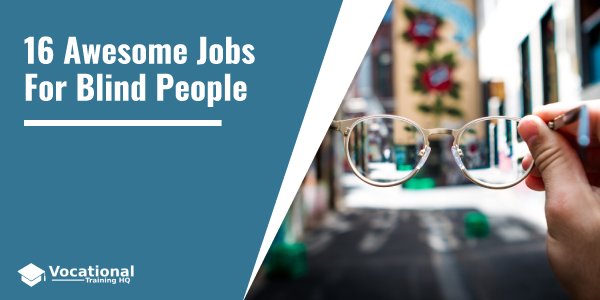Given the availability of new, life-changing technologies, there are increasing career opportunities for visually impaired people.
The American Foundation for the Blind has done extensive research about how technology can break down workplace barriers for blind people and what obstacles still impact employment outcomes.
In this research, 59% of respondents struggled to finish onboarding forms because of accessibility issues, while 25% did not have fully accessible access to their job training.
Unfortunately, 1/5 of participants considered not seeking additional accommodation because they were concerned about negative backlash in their workplaces.
These statistics show that many workplaces have a long way to go to make workplaces safe and effective for visually impaired or otherwise disabled people.
Thus, for many blind people, it’s essential to find careers that most lend themselves to a productive and exciting career.
However, with proper accommodations, blind people can participate in any job sector.
Article Table of Contents
- 1 16 Awesome Jobs For Blind People
- 1.1 1. Mental Health Professional
- 1.2 2. Physical Therapist
- 1.3 3. Personal Trainer
- 1.4 4. Journalist or Writer
- 1.5 5. Finance Professional
- 1.6 6. Architect
- 1.7 7. Engineer
- 1.8 8. Software Developer
- 1.9 9. Legal Professional
- 1.10 10. Public Servant or Politician
- 1.11 11. Teacher
- 1.12 12. Massage Therapist
- 1.13 13. Customer Service Representative
- 1.14 14. Motivational Speakers
- 1.15 15. Factory Worker
- 1.16 16. Scientist
16 Awesome Jobs For Blind People
1. Mental Health Professional
Mental health care is an important part of society, and blind people can become several different types of mental health professionals.
Counselors, therapists, and social workers can expect to make around $50,000 a year on average.
Still, to get into the career, these professionals may make less at first, and much of their salary will depend on the area where they work.
Psychiatrists are medically trained and have a much higher median salary of $208,000.
While medical school can lead to more obstacles and prejudice for blind people, there have been cases where blind people have successfully become doctors specializing in psychiatry.
Being a mental health professional can be draining work, but it is a great way to help people, and blind people often have a lot of empathy to share with patients.
2. Physical Therapist
Physical therapists have tactile careers, and they get to help people address physical issues and recover from injuries.
With many specialties to choose from, physical therapy is a diverse and rewarding career.
With 17% growth, physical therapy is a booming career, which is growing much more rapidly than other careers.
The $95,000 per year median pay for physical therapists shows how this career can offer financial security.
There are many good things about being a physical therapist, but this career can be labor-intensive, and many physical therapists are on their feet a lot.
Additionally, to be a physical therapist, you must be licensed and become a Doctor of Physical Therapy.
3. Personal Trainer
Do you love physical fitness and always want to spend time in the gym? Well, if that’s the case, being a personal trainer probably will fit perfectly for you, and yes, it is possible for blind people to be personal trainers.
Tyler Marren, a personal trainer, and paralympic athlete shows that anyone can share their love of physical activity and health.
4. Journalist or Writer
Communication is an integral part of human life, and by being a writer, that communication can become a career.
Writers can choose from many niches and discuss issues that are important to them.
A journalist or writer makes around $55,000 per year, and this is a good career for anyone with solid communication skills.
This job can require a lot of work for not as much pay, but as you become established in the career, you can grow with the profession.
5. Finance Professional
If you’re good with money and love helping people make the best financial decisions, being a finance professional is a great career, and it’s one that isn’t a problem for a blind person.
With a median salary of $89K, this career is solid.
With financial investment, you can boost your income even more.
While people have gotten into this career without degrees, it is usually good to have an economics or business bachelor’s degree, and many financial advisors even get master’s degrees to boost their knowledge.
This job often requires long hours, and many people in this career are very work-focused, so if you want more time home with your family, it may be harder to break into this career, but with proper work boundaries, it is still possible.
6. Architect
Because architecture seems so visual, many blind people may not realize this career is a viable option for them.
Chris Downey, a blind architect who strives to make more accessible designs, is an example of how blind people can learn to build skills and use technology to have careers in areas that seem very sigh-oriented.
Those who love to design and create plans could fall in love with architecture.
With an average salary of $88,000 each year, architects can expect to make good pay.
Architecture has an expected 3% growth rate which is two percent slower than the average among American jobs, so this slower job growth is something to consider when entering this field.
Additionally, architecture requires a bachelor’s degree and an internship or residency.
7. Engineer
Being an engineer is a lucrative and rewarding career, which helps build infrastructure and make sure the roads, bridges, and buildings that people take for granted are safe and secure.
Engineers require a four-year degree, and before becoming a full engineer, an engineer will be an Engineer in Training and have to take a test to show that they know what they need to know.
Thus, engineers learn a lot and must keep up with new information.
The median salary depends on the type of engineering, but the median across all engineering types is just under 80,000.
If being an engineer isn’t the right choice, you can also choose to be an engineering technician.
Technicians only need an associate’s degree and can earn up to $73,000 on average, depending on the area they choose.
For example, aerospace engineers and technicians earn higher than environmental engineers and technicians.
8. Software Developer
Being a software developer allows for extensive career growth because the career is in demand.
A 2017 survey showed that 1% of developers around the world were blind, and less than 1% of the total world population is blind, making software development an excellent choice for blind or visually impaired people.
Developers can expect to earn a median salary of $110,000 each year, and combined with the high demand for software development, this career is an exciting choice.
There are lots of perks to being a software developer, but this career does require a college degree.
Some positions may also require a master’s degree.
Thus, it can take some time to get going in this career.
9. Legal Professional
Because they have been forced to face unfair challenges, blind people often are even more passionate about justice.
Whether aspiring to be a judge, lawyer, or paralegal, there are many careers in the legal profession that can fit anyone who loves justice and believes in the legal system (or wants to improve the legal system).
While the salary will depend on the position someone takes, the median salary for a lawyer is nearly $125,000 each year.
Meanwhile, the average salary for a paralegal is around $53,000.
While paralegals generally have a bachelor’s degree, lawyers need to get a Juris Doctor degree, which generally requires seven years of schooling.
Lawyers also need to continue their education to stay in practice.
10. Public Servant or Politician
Public servants and politicians are often associated with the negatives of government, but they hold important positions and keep society running.
Without these people, we would struggle to accomplish much of anything.
The salary range for people in these positions can range greatly.
While those in national positions make a lot more, most public servants and politicians do not make a lot, and they run because of their desire to help their communities and create the changes they think will be helpful.
11. Teacher
If you love explaining information and sharing it with other people, being a teacher could be the right career for you.
Unfortunately, teachers are known for being underpaid, and while the median salary is $52K, this is across all positions and institutions, so the number is much lower in many schools.
However, blind people can often use their own experiences to help teach, no matter the level of education they are teaching.
12. Massage Therapist
A massage therapist is one of the most cited careers for blind people for a good reason.
Therapists use the joints and soft tissues of the body to apply pressure and help people relax stiff or pained areas.
Massage therapists often work in settings like spas and health offices, or they go to clients’ homes.
Massage therapists make around $46,000 per year, and with a 20% growth rate, this job will have a lot of demand based on ten-year industry predictions.
While there’s lots of potential for this career, it does require you to get a certificate before you get started, and you must feel comfortable touching people’s bodies and making them feel comfortable as you do it.
13. Customer Service Representative
Being a customer service representative is one of the most blind-friendly careers because technology can easily help blind people complete their jobs efficiently and without as burdensome accommodations as some of the other careers on this list.
While a customer service representative only gets paid around $17 an hour and around $28K to $44K a year, this work is rewarding for people who like talking to other people and solving problems.
This job can sometimes even be done from the comfort of your home.
The good news is that this career is growing faster than average, so there is fantastic job security for these professionals.
14. Motivational Speakers
Many blind people have gone through hard things during their lives.
Society doesn’t always treat people with disabilities well, so often, blind people have had to work harder to prove themselves and to find success.
Thus, they often have the material to be motivational speakers.
Motivational speaking is a great way to connect with other people.
Motivational speakers often travel, which can either be a perk or a downside, depending on what you need in your life.
Additionally, it can be hard to get started in this career, but the average salary is $68,000; however, the range of what motivational speakers make is anywhere from around $10,000 (or less) to $300,000.
15. Factory Worker
While factory work isn’t the first thing that people think about when considering the best jobs for blind people, it is a common job for blind people to have because the work usually requires simple tasks like pressing a button.
The simple nature of this career allows blind people to make a living without having to advocate for as many accommodations as some of the other careers on this list.
This career usually only requires a GED and basic job training.
The average starting salary is around $20,000.
Some people love the many perks of factory work, like the ease and chances to earn higher rates with overtime or the chance to advance into supervisory positions.
However, for some people, the job doesn’t have enough variation, and they get tired of doing very repetitive work all day.
Factory workers can also spend a long time on their feet and are not in the most comfortable positions.
16. Scientist
If you love understanding how the world works, being a scientist may be a good fit for you.
With plenty of research and hands-on opportunities available, scientists are diverse, and no matter your interests, you can find something that appeals to you.
The great news is that there are many ways to study the world without having to see it.
The average salary is just over $74,000 each year.
Science is not for everyone, and being a scientist usually requires not just a bachelor’s degree but often a master’s degree as well, and it can take a lot of time to develop a professional reputation and be able to be in charge of your career.
















